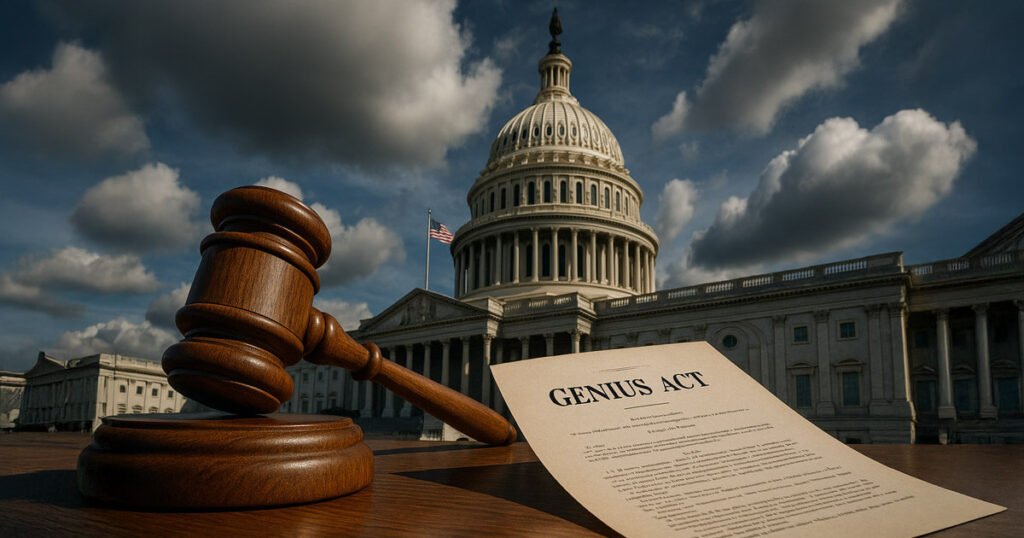The GENIUS Act: A Transformative Move Toward Digital Asset Regulation
In a significant development for the digital asset landscape, the U.S. Senate has advanced the GENIUS Act, following a 66–32 cloture vote on May 19. This milestone illustrates an unusual display of bipartisan support, with numerous Democrats joining Republicans to propel the bill forward after extensive discussions. As the proposed stablecoin legislation now heads to the House floor for further consideration, it brings a myriad of implications for the future of digital finance in the United States.
Bipartisanship Amid Contentious Provisions
The journey of the GENIUS Act has not been without challenges. Initially, it faced substantial pushback from several Democratic lawmakers who expressed concerns about its provisions that limit consumer protections. Critics feared it could allow corporate issuers to evade accountability and flagged ethical exemptions for political figures, particularly former President Donald Trump. These worries played a critical role in derailing an earlier vote. However, fruitful negotiations between Senate leaders and crypto policy advocates eventually led to a reexamination of the bill’s stipulations. Compromises were reached concerning consumer rights, transparency in political donations, and ethical boundaries for technology firms, which helped resolve the dissent and garner crucial support.
Continued Opposition and Concerns
Despite the bill’s progress, not all lawmakers are convinced of its merits. Senator Elizabeth Warren, a well-known skeptic of cryptocurrencies, has remained an outspoken critic. She argues that even with recent enhancements, the GENIUS Act still leaves considerable weaknesses that could jeopardize consumers and the broader financial ecosystem. Warren’s statement encapsulates her concerns: “There is no excuse for Congress to pass a crypto bill that will turbocharge Trump’s corruption.” Such critiques underscore the ongoing debate surrounding the balance between fostering innovation and safeguarding consumers in a rapidly evolving technological landscape.
Celebrating a Landmark Moment
Supporters of the GENIUS Act are heralding the Senate’s approval as a pivotal moment for the digital asset industry. Senator Bill Hagerty hailed the bill’s potential to not only bolster the global standing of the U.S. dollar but also increase demand for U.S. Treasuries by over $1 trillion. He expressed optimism that the legislation could modernize the U.S. payment framework, ensuring faster digital transactions while fortifying the dollar’s dominance. In a similar vein, Bo Hines, Executive Director of the President’s Council of Digital Asset Advisors, described the Act as a strategic upgrade to America’s financial infrastructure, reinforcing the country’s leadership in the digital economy and paving the way for innovation in the sector.
Broader Implications for Regulatory Certainty
The GENIUS Act is expected to have far-reaching consequences, particularly in establishing regulatory clarity surrounding fiat-backed stablecoins. The Oracle blockchain network, Chainlink, pointed out that the legislation would likely encourage widespread adoption by ensuring a foundational regulatory framework. The Cedar Innovation Foundation echoed this sentiment, indicating that the Act reflects a growing voter demand for comprehensive rules governing digital assets. Such regulatory certainty could usher in more robust market structure reforms, which have been long awaited by industry participants.
Preparing for Future Innovations
While the GENIUS Act’s passage is a positive step toward comprehensive digital asset regulation, it also signals an evolution in how governments and industry stakeholders will engage with emerging technologies. As Congress prepares for further discussions and deliberations, the implications of this legislation will extend beyond stablecoins and digital currencies. The shifting landscape presents an opportunity for policymakers to establish forward-thinking frameworks that not only protect consumers but also stimulate innovation and economic growth.
In conclusion, the GENIUS Act stands at the intersection of innovation and regulation, inviting a dialogue about the future of digital assets in the United States. With bipartisan support and a commitment to addressing prior concerns, this legislation could reshape the financial landscape, ushering in a new era of digital finance. However, as lawmakers move forward, the ongoing debate will be vital in ensuring both innovation and consumer protection are upheld in this rapidly evolving domain.


